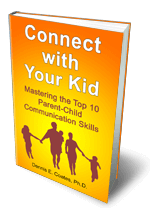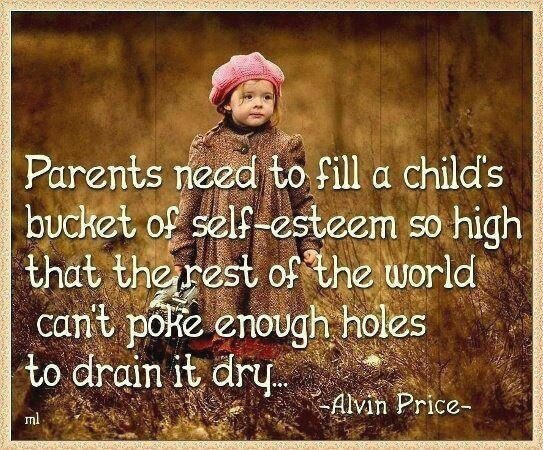Self-esteem is how people see themselves – their perception of self-worth, who they believe they are.
Low self-esteem can build from making mistakes, from not forgiving oneself, and from too much criticism from authority figures such as parents, elders, teachers, or employers. Young people can end up with a low opinion of themselves and conclude that they aren’t worthy of trust, friendship, or love. This can affect the kind of people they associate with. It can affect whether they’ll try to excel. Low self-esteem hurts, and eventually even little things can cause pain, discouragement or depression.
Not what we want for our kids!
I do like this quote.
But unfortunately, many well-intentioned parents try to nurture strong self-esteem the wrong way. They’ve been told – and believe – that they should make a habit of praising their child for nearly everything they do. The problem is, kids sometimes don’t try to do their best. They experiment with behavior that can thwart their ultimate self-development and maturity. Praising and rewarding a child as a matter of parental policy can backfire.
Kids may be innocent and lack experience, but they aren’t stupid. When they’re showered with unearned praise, they know they don’t deserve it. When they begin to question the parent’s judgment, praise will lose its value and credibility; and the child may come to distrust any positive feedback from the parent. When praise is given, they could conclude that it’s untrue, which would lead to lower self-esteem – the opposite of what the parent hoped for.
It’s a common parental mistake.
But there’s a right way to praise a child. Yes, you want to praise more often than you complain or criticize. You want to change your pattern of catching them doing things wrong to catching them doing things right.
In other words, notice when they’ve made an effort. Notice when they’ve accomplished something significant as seen from the child’s perspective, rather than an adult perspective. Even if they made a mistake or came up short, the fact that they put forth their best effort is what counts.
This means: Be there when it happens, describe what you observed in specific detail, and tell your child how pleased you are.
- “Yes, Honey, the other girl played well and beat you. But your backhand was terrific today, and I loved how you broke her serve four times. You really kept your head in the game, even though she was ahead.”
- “Thank you for putting your toys away. You put things where they belong, and your room looks so much better.”
- “I’m proud of you for standing up for your little sister when those kids were calling her names.”
Praise your child for the actions that make you proud, behavior that shows he or she is growing up to be the kind of person you want them to be. Give your child earned praise, praise your child instinctively knows is sincere – not false, empty praise.
 More truth-telling about parent-teen communication.
More truth-telling about parent-teen communication.
Read Chapter 9, “Express Appreciation” in Connect with Your Kid: Mastering the Top 10 Parent-Child Communication Skills.
You can grow the bond with your child through better listening. Download the FREE ebook, Listening to Understand.

